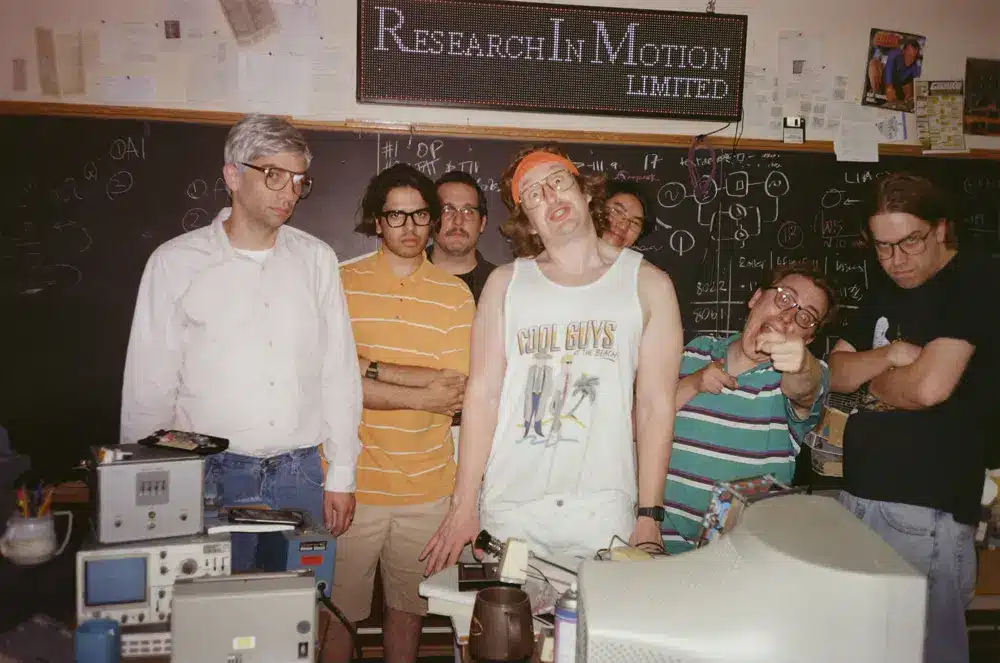Almost everyone knows that Steve Jobs’ unique vision, unrelenting drive, and technological skill spawned the iPhone, a cultural revolution that continues to influence culture 16 years after the late Apple co-founder first showed the device to the world.
However, when Steve Jobs unveiled the first iPhone in 2007, another smartphone was a must-have accessory. It was the BlackBerry, a device so addictive that it was dubbed the “CrackBerry” by IT nerds and power brokers huddled over a tiny keyboard best used with both thumbs clickety-clacking.
The BlackBerry is now known as “that phone people had before they bought an iPhone,” a relic so obsolete that the Canadian firm that created it is now worth $3 billion, down from $85 billion at its peak in 2008, when it controlled nearly half of the smartphone industry.
But its legacy is worth remembering, and moviegoers will be able to learn more about it in the upcoming film “BlackBerry.” The film opens in theatres on Friday and is the latest film or television series to explore technology’s penchant for innovative innovation, blind ambition, ego clashes, and power battles that morph into morality plays.
That technique has already resulted in two Academy Award-nominated films scripted by Aaron Sorkin, 2010′s “The Social Network” on Facebook’s founding and 2015′s “Steve Jobs,” about the Silicon Valley legend. Then there was last year’s rush of TV series investigating the crises surrounding WeWork (“WeCrashed”), Uber (“Super Pumped”), and disgraced Theranos CEO Elizabeth Holmes (“The Dropout”), which won Amanda Seyfried an Emmy for her performance.
The BlackBerry is now known as “that phone people had before they bought an iPhone,”
“BlackBerry” is told as a dark comedy centered on two friendly but clumsy geeks, Mike Lazaridis and Doug Fregin, who can’t seem to execute their idea to create a “computer in a phone” until they bring in a hard-nosed, foul-mouthed businessman, Jim Balsillie.
Although “BlackBerry” is based on the painstakingly researched book “The Lost Signal,” director and co-star Matt Johnson admitted in an interview with The Associated Press that he took more liberties in the film. Among other adjustments, Johnson mentioned altering some timelines, molding the company culture through his 1990s perspective, and infusing the important characters with “our own personalities and ideas.”
“But our lawyers wouldn’t let us put anything in the film that was an outright fabrication,” Johnson explained.
Johnson had to make a lot of assumptions on his part as the enigmatic Fregin, who sold all of his shares in BlackBerry’s holding company — then known as Research In Motion, RIM — about the same time Apple unveiled the first iPhone and has remained low-key ever since.
“Doug is a true cypher, he has never done a taped interview,” Johnson added, describing Fregin as a “kind of mascot figure who is tying the culture of the office together.”
Ironically, Johnson got much of his inspiration for Fregin from one of RIM’s early workers, Matthias Wandel, who released a YouTube video criticizing mistakes in the “BlackBerry” teaser. Previously, Wandel briefed Johnson on RIM’s history and even shared journals he kept during the development of the BlackBerry.
The BlackBerry is now known as “that phone people had before they bought an iPhone,”.
“I think he’ll be quite charmed when he sees the film because so many of his original notes are in it,” Johnson said of Wandel. “It’s so funny that he released that video (because) he inspired so much of my character.” I stole everything from him. I owe him a lot.”
Balsillie, RIM’s co-CEO with Lazaridis, emerges as the most intriguing guy in the film. Balsillie is portrayed by actor Glenn Howerton (best known for his role in the TV series “It’s Always Sunny in Philadelphia”) in a way that casts him as both the story’s main antagonist and protagonist, dropping f-bombs in tyrannical temper tantrums while making savvy moves that turned the BlackBerry into a cultural sensation.
“It always felt like this was a guy who weirdly felt a little outside of what people would consider to be sort of a titan of technology or business,” Howerton said of Basillie in an AP interview. “I played him almost always as someone who had something to prove, that he could play with the big boys.”
Balsillie eventually became embroiled in legal issues stemming from unlawful modifications to the pricing of stock options, a practice known as “backdating” that also implicated Apple’s former general counsel and former chief financial officer in 2007 for handling pay packages issued to Jobs. Balsillie and Lazaridis both left RIM in 2012.
Balsillie appears to be enjoying the renewed attention from the new film now that BlackBerry has receded from public consciousness, although quibbling with some aspects of his character in a recent interview with The Canadian Press.
Unlike Lazaridis and Fregin, Balsillie attended a recent screening of the film in Toronto and even walked the red carpet alongside Johnson and Howerton.
“In many ways, (Jim) was the hero, the character who changed for the better (in the film),” Johnson explained. “The audience was completely focused on him. It was almost a hallucinogenic sensation to be in the theatre with Jim, who was the one who was laughing the hardest.”
Balsillie, who is teased in one scene for not having watched “Star Wars,” told Howerton that he enjoyed seeing “BlackBerry” so much that it was the first movie he had ever seen twice in his life.
SOURCE – (AP)











